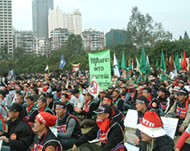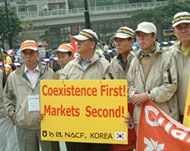The faces of the WTO protesters
The hundreds of disparate groups marching through the streets of Hong Kong this past week are united in one cause – an opposition to World Trade Organisation policies that they say are destroying their livelihoods.

Filipino fishermen, Thai workers, South Korean farmers and Indian activists, among others, used a combination of amateur theatrics, garish costumes and the power of the human voice to deliver their message.
For many of these protesters, however, it will be to no avail. Short of a collapse of the WTO mechanism, many are simply at the wrong end of a dispassionate economic curve.
The largest group of protesters, 1500 South Korean farmers, has been instrumental in ensuring the movement garners worldwide publicity. With matching uniforms, inspiring martial music and a strong group discipline, they are rewriting the demonstration rulebook.
On Saturday, at least 60 mostly South Korean protesters were hurt when they attempted to breach a security cordon around a site hosting a WTO meeting.
Several police officers were injured in the melee.
Publicity stunts
Until Saturday’s violence, protesters had carried out carefully planned publicity stunts.
On Tuesday, donning bright orange lifejackets, about 50 of them jumped into Hong Kong harbour in a valiant but ultimately doomed attempt to swim to the harbour-front exhibition centre where the conference is being held.
 |
|
The farmers made their symbolic |
Two days later, columns of farmers were on their hands and knees, shuffling their way along the 3km march route emulating a Buddhist ritual of appeal. To the beat of a gong, the farmers would take three steps forward, shout “No, No, WTO,” then get down on their knees and prostrate themselves along the closed off road.
Often described as militant in the media because of clashes with police in South Korea and the public suicide of one of their members in Cancun, local fears that there would be widespread mayhem have been unfounded.
Though threatening to increase the tempo if there appears to be a deal on the WTO table, the most radical acts have been to briefly scuffle with riot police and paint the walls of the US Consulate. Both acts were carried out in front of the clicking lenses and helmeted heads of the world media.
Behind the ubiquitous khaki jackets and beaming smiles, however, are often desperate tales. Several farmers and their supporters painted a despairing picture of economic malaise, bankruptcy and depression.
 |
|
Thousands of demonstrators |
The protesters, mostly small family farmers for whom agriculture has been a way of life for generations, are able to neither compete with cheaper imports, nor export to protected and subsidised developed markets.
Song Won-Kyu, of the Korean Peasants League, said: “WTO supports international companies like Monsanto. Family farms are being destroyed,”
Dispelling media hype about the group’s aggressive tactics and public acts of suicide, Song said that the high rate of bankruptcies has driven Korean farmers to kill themselves out of depression and shame.
Farmer migrations
Pramela Pushparaj, from the Indian branch of Women Say No To WTO, said: “Many farmers have died because we have been forced to buy hybrid and genetically modified crops. We are forced to grow these crops but we cannot keep the seeds, so every year we need to buy new seeds. Now we have no money.”
 |
|
Protesters from Korea were |
Representing small farmers from the southern Indian city of Chennai, she said it is no longer possible to compete against large companies and landowners with the result that millions have had to leave for the cities.
“Many women have now become sex workers,” she added.
She has been calling for a ban on pesticides, an end to mechanisation and a return to natural farming.
From the Assembly of the Poor in Thailand, Veerapol Sopa had a similar story.
“Our purpose in coming here is to oppose any agricultural agreement and this so-called free trade.
“Over the past 10 years our debt has increased while our incomes fell. We cannot compete any more. While Europeans enjoy subsidies we have nothing. We want an end to WTO before WTO destroys us.”
Agricultural subsidies
Meeting to resolve the Doha round of trade talks, negotiations prior to Hong Kong had stalled over calls from developing countries for greater access to American and European Union markets and an end to agricultural subsidies.
At the same time, developed countries are seeking increased access for services and manufactured goods in the developing world.
 |
|
Members of the media don |
Demanding a more humane approach to development, the complaints of demonstrators were echoed inside the conference centre, where more than a thousand NGOs and trade groups are directly lobbying government delegations.
Supporting protectionist barriers for farmers, Christie Ko, the spokeswoman for Oxfam Hong Kong, told Aljazeera.net that developing countries needed to support threatened industries.
“I agree with the South Koreans. We believe that without local protection of farming the negative impact will be much bigger,” said Ko.
Staging their own, more subdued protest inside the exhibition centre, members of the Free to Trade Coalition were on Thursday knocking down a wall of cardboard boxes meant to symbolise tariff barriers.
Sympathetic of the farmers’ plight, Barun Mitra, a coalition member, told Aljazeera.net that reality needed to be faced.
“Defying the history of economic development will perpetuate them to eternal poverty. Any country that has made any degree of economic development has done it by moving away from agriculture towards manufacturing and services.”